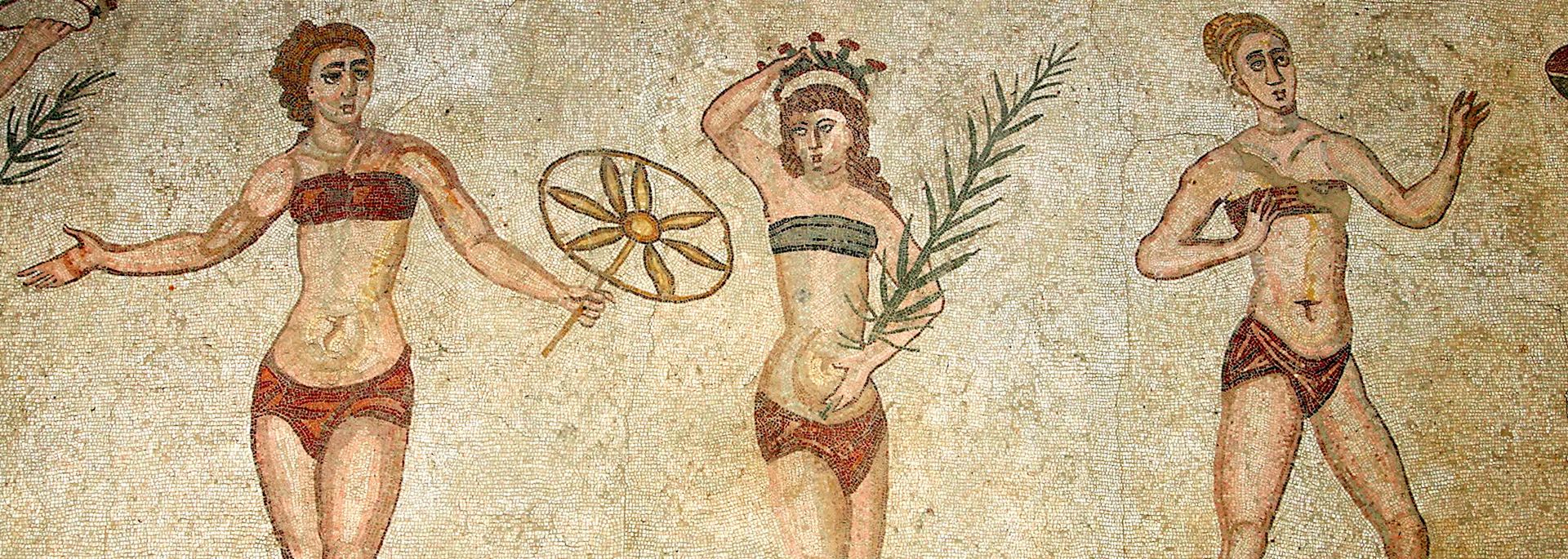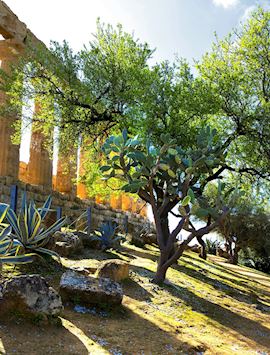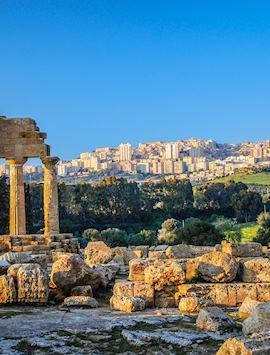Jump to:
Sicily's most important Roman site, Villa Romana del Casale is a palatial place most famous for its extraordinary floor mosaics. The sheer size of the buildings and the extent of the mosaics make it one of the most significant Roman sites in the world, its treasures well preserved by a thick covering of mud for over 700 years.
Today, the villa is a UNESCO World Heritage Site and understandably one of Sicily's most popular visitor destinations. In its heyday it would have been one of the grandest and most luxurious homes in the whole empire; a visit offers a fascinating glimpse into the life of the Roman elite.
Built in the 4th century on the site of an earlier, more modest, Roman home, the Villa Romana del Casale is made up of four interconnecting groups of buildings. It’s thought that at least some of the buildings were in use until about the year 1000 when they were abandoned. Then, in the 12th century, a large landslide consumed the site.
It was only in the 1950s that concerted efforts were made to unearth the villa during the course of a major archaeological excavation. Some parts of the site, such as the slave quarters and outbuildings, are as yet unexcavated. Following another major restoration effort to preserve the mosaics, the site reopened to the public in 2012.
The grand complex may have belonged to Maximian, one of four co-emperors of Diocletian, or possibly to an aristocratic senator who grew rich by supplying exotic wild animals captured during hunts and grain from the villa’s farm to Rome. Either way, the scale and decoration of this private residence mark it out as one of vastly important standing.
The villa was at the heart of a vast agricultural estate and has over 50 rooms featuring elaborate mosaic floors. The quality, detail and richness of the mosaics, along with their surface area, is what makes them so special.
Almost every room you enter, from the thermal baths, to the formal dining room and grand basilica, is decorated. Scenes from provincial Roman life, Homeric poems, mythology and nature are vividly depicted. It’s thought the mosaics were created by North African craftsmen who were renowned for their skills and the images they portrayed give us many clues about the social and economic structure of the time.
Particular highlights include the ‘Corridor of the Great Hunt’ which depicts a range of scenes illustrating the capture of live animals such as tigers, leopards, antelope, rhinos and elephants which extends along the full length of a major corridor. The other standout mosaic is in the 'Room of the Palestriti' where ten scantily-clad maidens are shown training for an athletic event with weights, balls and a discus.
The villa is located in a wooded valley just outside the town of Piazza Armerina, whose medieval core is a labyrinth of winding alleys. A large Baroque cathedral and the elegant Piazza Garibaldi are the main sights, though if you’re visiting in August the town erupts with the annual Palio dei Normanni which celebrates the liberation of Piazza Armerina from the Moors in 1087. During the pageant a re-enactment of the arrival of Norman Count Roger is followed by a jousting competition between the four rival districts of the town.
who's been there

Start planning your tailor-made trip to Villa Romana del Casale by contacting one of our Italy specialists
-
617-223-4521617-223-4778
- Make an inquiry
Suggested itineraries featuring Villa Romana del Casale
Our itineraries will give you suggestions for what is possible when you travel in Villa Romana del Casale, and they showcase routes we know work particularly well. Treat them as inspiration, because your trip will be created uniquely by one of our specialists.
Places near Villa Romana del Casale
- Sicily 27 miles away
- Ragusa, Modica & Noto 37 miles away
- Agrigento 42 miles away
- Mount Etna 45 miles away
- Syracuse 57 miles away
- Taormina 63 miles away
- Palermo 75 miles away
- Erice and Trapani 107 miles away
- Marsala 109 miles away
- Capri 221 miles away
- Sorrento 226 miles away
- The Amalfi Coast 227 miles away
- Ischia 235 miles away
- Pompeii 235 miles away
- Herculaneum 238 miles away
- Naples 240 miles away
- Matera 259 miles away
- Puglia 280 miles away
- Alberobello 284 miles away
- Fasano 290 miles away
- Ostuni 291 miles away
- Lecce 293 miles away
- Otranto 296 miles away






